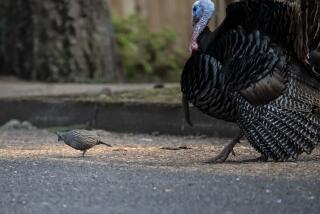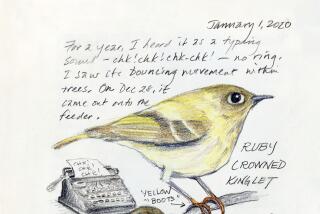Another One Flew Over the Cuckoo’s Nest
- Share via
In disavowing my reputation as a bird expert the other day, I made a statement about the cuckoo that proved my point.
Nancy White of Glendale had asked my opinion about a theory she had heard that the Earth is a giant egg laid by a cosmic bird, and that its internal rumblings are caused by the unhatched chick kicking about.
Ms. White said she doubted the theory on maternal grounds: “What kind of bird would leave her young unattended for so long?”
I observed that the human being is not the only animal that abandons its young. “Also irreverent of the nesting instinct,” I said, rather off the point, “is the cuckoo bird, which is reputed to raid other birds’ nests and eat their eggs.”
Now Elizabeth A. Ross, a senior in biology at UCLA, has fallen on me like a cosmic bird. First, she says, the bird is a cuckoo, not a cuckoo bird . Then she says the cuckoo is notorious not for raiding other birds’ nests and eating their eggs, but for laying its own eggs in another’s nest. Thus she avoids building her own nest, sitting her eggs or feeding and caring for her young.
Meanwhile, J. Stanley Hauxhurst of Corona del Mar notes that the unsuspecting foster parents hatch the cuckoo egg, whose occupant soon outgrows its fellow nestlings and roots them out of the nest to their deaths, or hatches first and pitches their eggs out.
He notes also that the baby cuckoo has developed a saddle-shaped curve in its back to help accomplish this murder, which suggests what cruel ends evolution may be shaped to.
In further reading I have learned that the cuckoo sometimes drops an egg from the nest, replacing it with one of her own, so the foster parents will not find an extra egg and be suspicious. No bird that Machiavellian deserves an apology.
More exasperating is Ms. Ross’ exception to a word I used. In defining the limit of my expertise on birds I recalled that a woman in the Valley once asked me to identify a large glossy black bird that goes “caw,” and I was able to inform her that the bird she had in mind was a crow.
Ms. Ross notes first that the bird might have been a raven. Worse, she implies that the word goes is inappropriate. “Is this modern English for says or sounds like ?’ ” she asks. Evidently Ms. White is not aware that goes has indeed replaced says among the young. And, besides, says would certainly be inappropriate for a crow, or even a raven.
Expert I may not be, but I am not a complete ignoramus about birds. I know, for example, that the cuckoo bird lives in a wooden clock, especially in Switzerland, and that on every hour it pops out to go “cuckoo” from one to a dozen times to count the hour.
Bill Britton, a counselor at Cal State L.A., says he must disabuse me of the notion that other animals besides human beings abandon their young. He says, “Name me three mammals that abandon their young.”
I didn’t say mammals; I said animals . The wasp never knows his parents. Reptiles are in general indifferent parents. Fishes shed their eggs to the mercy of the sea. As for mammals, I am told by Sarah George, mammalogist at the Natural History Museum, that some mammals do indeed abandon or fail to help their young if they are weaklings or circumstances are not favorable for their survival; also, there is some infanticide.
While I’m in the confessional, I might as well confess another error that truly wounds me, since it destroys a romantic fantasy I have held for most of my adult life.
I recalled the other day that I had learned the Polynesian song, “Farewell My Tane,” when I was a youth going to sea, and that I dreamed of finding my own Tane some day. I said the song still moves me.
Alas, Ann Jensen of El Segundo tells me that Tane (Tahn-ay) is the Tahitian equivalent of the Hawaiian word kane , meaning man , and that the song was written to be sung by a woman.
Oh, well, as Joe E. Brown says in “Some Like It Hot” when his love object turns out to be a male: “Nobody’s perfect.”
More to Read
Sign up for Essential California
The most important California stories and recommendations in your inbox every morning.
You may occasionally receive promotional content from the Los Angeles Times.













